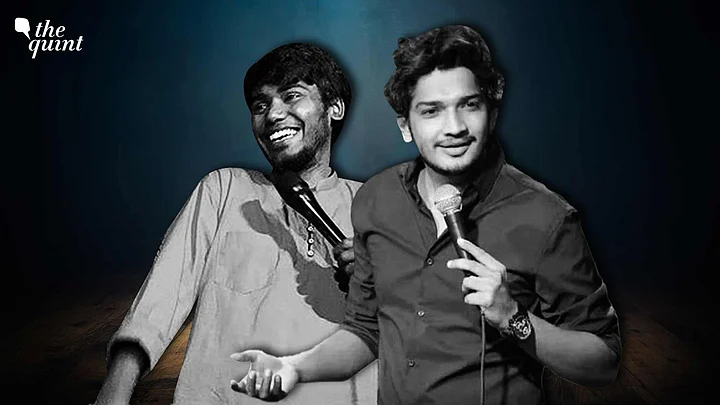The extraordinary rise of the stand-up comedy industry in India and its growing foothold over pop culture would seem unprecedented even a decade back.
A comedian like Zakir Khan’s Sakht Launda playbook or Varun Grover and Munawar Faruqui's political satires have gripped the imagination of many, especially the youngsters in the country, by carving a niche for themselves.
While the Internet has aided in the promotion of comedy as a creative art form, the transformation in its tone and tenor is noteworthy as well. Today, one doesn't have to participate in a comedy show to get noticed but anyone with the gift of humour and storytelling can enter into a market where the audience is constantly craving fresher content. It provides a level-playing field to everyone.
While it is getting inclusive and progressive by the day, one cannot deny the role of performing art in influencing and shaping socio-cultural and political narratives around us.
The Predominance of Caste in Indian Comedy
So far so good. Where does the problem arise then? It is important to understand the context in which this industry operates. It is heavily centered around the Tier 1 and Tier 2 cities of India where comedy clubs and open-mics studios are located. Look at any stand-up video with millions of views and comments and the chances of it being performed in a metropolitan city like Bangalore or Delhi are sky-high.
The industry continues to be an urban phenomenon and the logical corollary to this is a comedy that panders to an urban crowd. Performances satirise our daily struggles with the Ola drivers or rant about the annoying maid being a separate power centre in our households or the inconvenience of haggling with the vendors in the local supermarket.
Moreover, the comedians delivering these performances packed with punchlines and truth bombs are characteristically upper caste and English or Hindi-speaking individuals. The cultural stereotypes and social mores which are picked upon and laughed upon come at the expense of marginalised and oppressed communities.
Casteist jokes ridiculing Mayawati (a Bahujan, political female leader in Uttar Pradesh) or mocking affirmative action are problematic as they give impunity to discriminatory attitude under the ‘garb of humour’.
However, it would be unfair to put a blanket statement and label the industry as socially tone-deaf. Stand-up comedy in India has also challenged dominant social narratives on issues ranging from the LGBTQI+ community (Vir Das—For India) to political and communal hatred (Varun Grover—Padmaavat and the Parrot).
However, the discourse on caste in comedy remains missing or at best, in its infancy. The paper titled Humour and the Margins: Stand-Up Comedy and Caste in India by Madhavi Shivaprasad reveals the structural barriers and intersectional discrimination present in the stand-up comedy industry.
Comics who belong to the upper castes and upper/middle classes possess the economic and socio-cultural capital needed to break into the industry and consolidate themselves. Naturally, the content which is delivered covers the lived experiences of the higher rung of Indian society which is reaffirmed by an audience belonging to similar status groups.
Stand-Up Scene Is Riddled With a Lack of Representation
The narrative on caste in stand-up comedy lacks the representation of those who require it the most—the Scheduled Castes and Tribes of India. A ‘progressive’ Savarna comedian can critique the caste system. However, it can never substitute a Dalit comedian’s narration of his/her lived experiences.
A bottom-up view of the caste system can only come from those who are at the bottom of the ladder. The inclusion of Dalit comedians in the industry by actively platforming and promoting them can lead to newer perspectives on a range of social issues. It will actively challenge the cultural imperialism of the upper castes within the stand-up comedy industry.
It is pertinent to learn from the example of Black Comedy which has received a rousing reception in the West. Performers like Chris Rock and Dave Chapelle have brought forth the stories and experiences of the Black folks in the USA.
Their observations and anecdotes have seeped into their style of comedy which not only evokes laughter but also calls out the institutional racism and discrimination faced by their community. However, it distinguishes itself as the humour sheds off the victimhood and they laugh against their oppression on their own terms.
Back home in India, it is encouraging to notice Dalit and Queer comedians breaking into this industry. In an interview to Article 14, a young Dalit comedian Manjeet Sarkar belonging to Bastar, Chattisgarh shared his experiences of endeavouring into stand-up comedy. He routinely faces intersectional discrimination within a biased industry.
However, with his humour on stage, he brings his experiences as a Dalit man in front of a savarna audience. It is sharply different from the overused and stale stories of the average metropolitan crowd and brings a fresh and understated perspective to the audience.
They shift uncomfortably in their seats and laugh nervously as they realise the comfort (and guilt) of their caste privilege. However, they are receptive and encouraging when Sarkar transforms humour to touch upon caste discrimination, a discussion which has been pushed to the margins.
Despite the trolling which these young Dalit comedians face, it is encouraging to learn about their determination to make it big within the stand-up comedy space. It is imperative that we, as the audience recognise these comedians and their stories and move towards a more inclusive and sensitive cultural space.
(Divyansh Nautiyal is a second-year law student at the NALSAR University of Law, Hyderabad. This is an opinion piece and the views expressed above are the author’s own. The Quint neither endorses nor is responsible for them.)
(At The Quint, we question everything. Play an active role in shaping our journalism by becoming a member today.)
